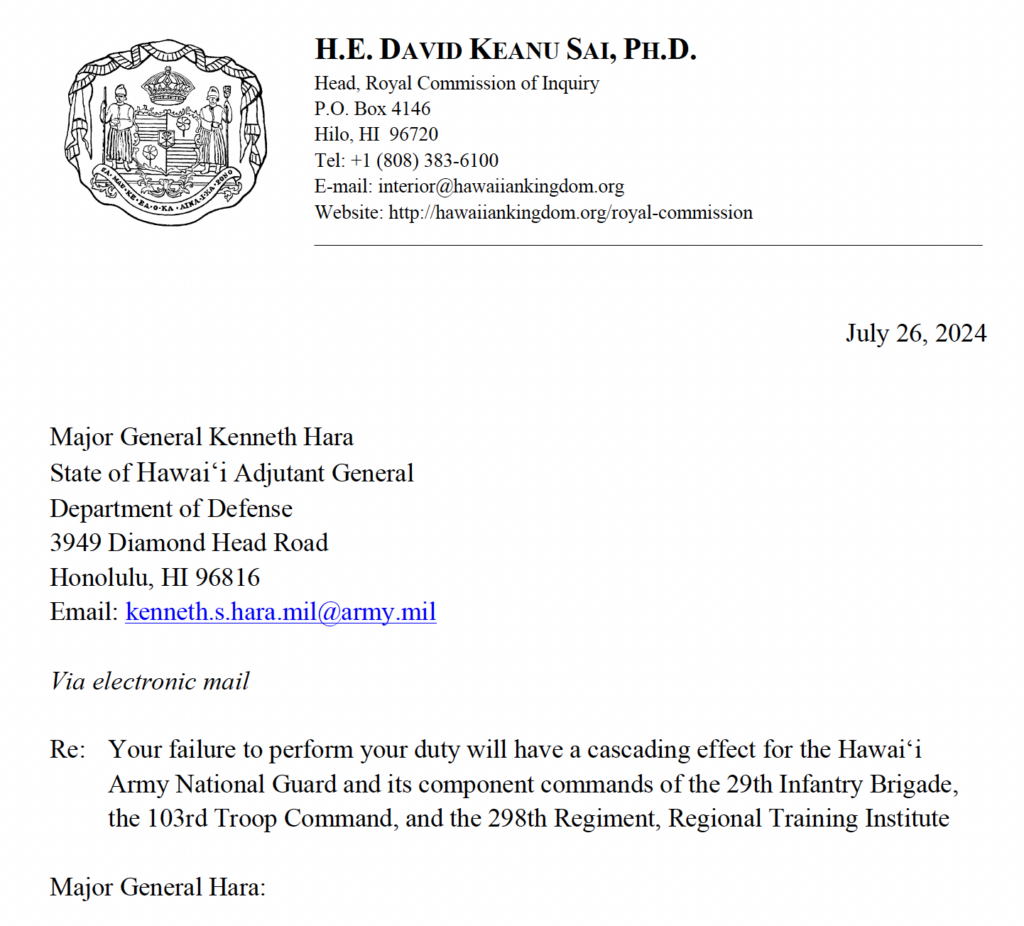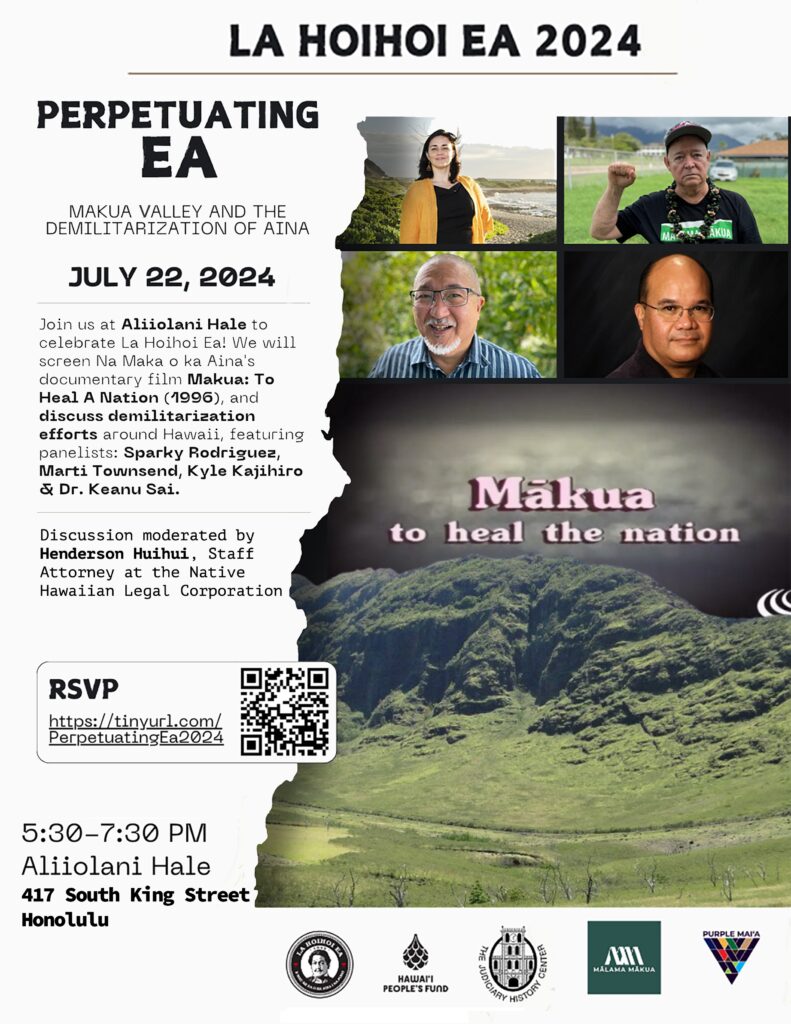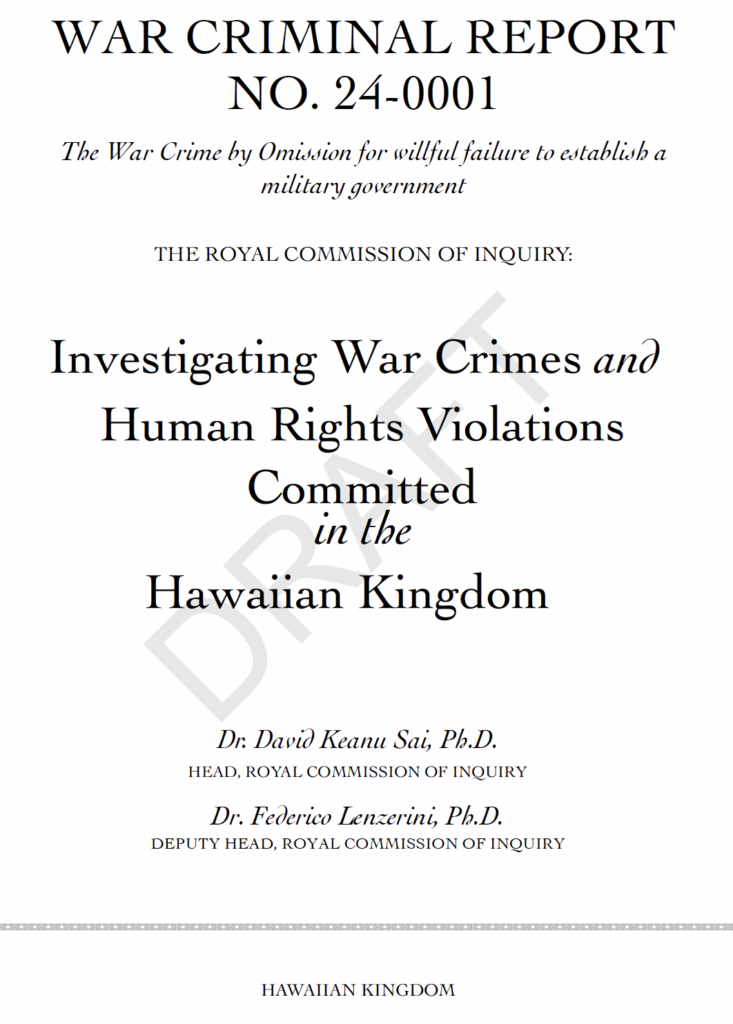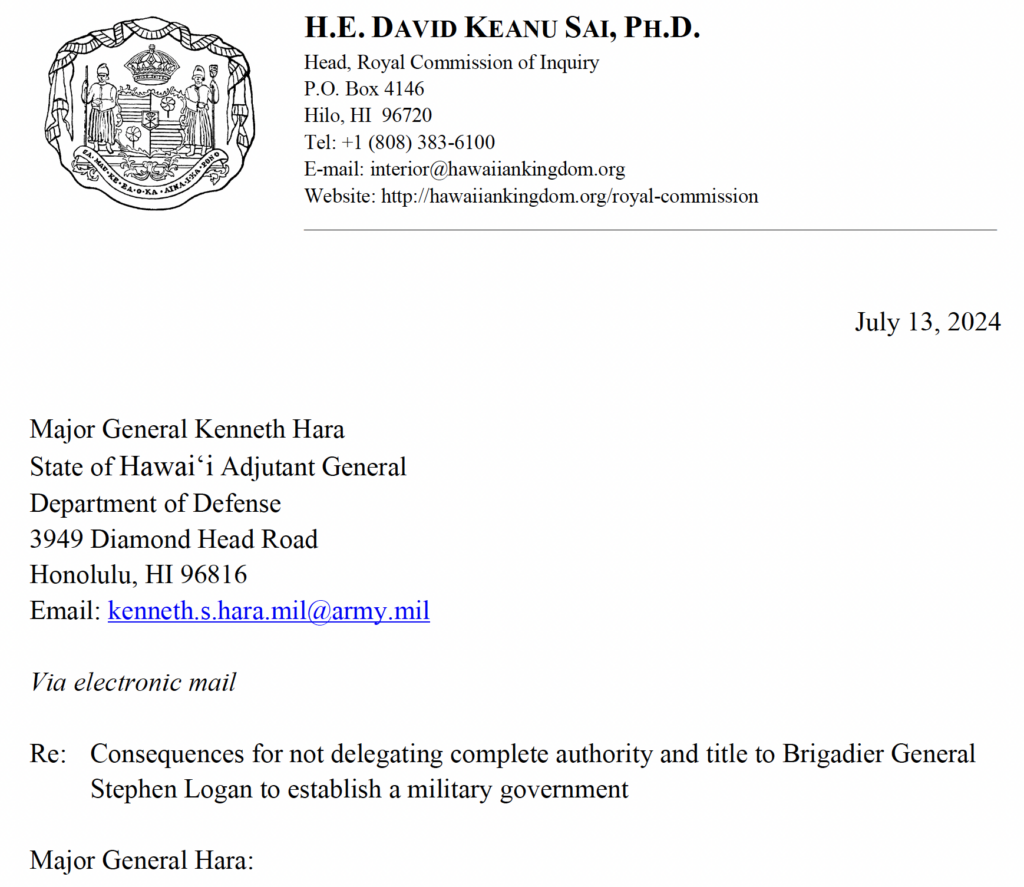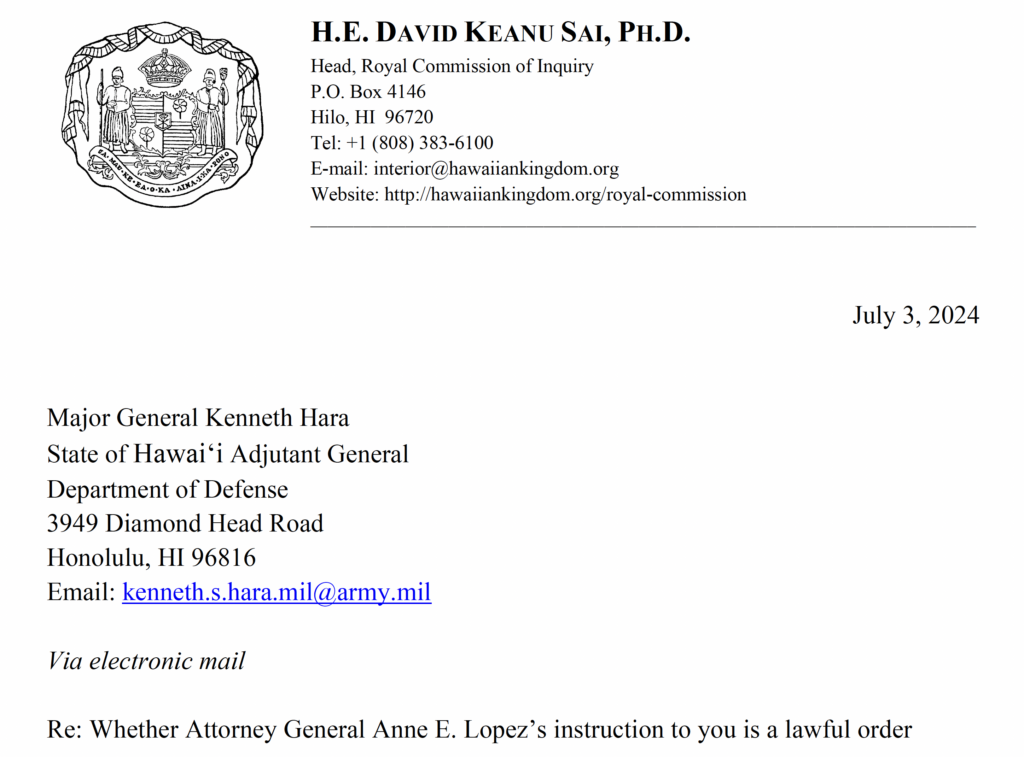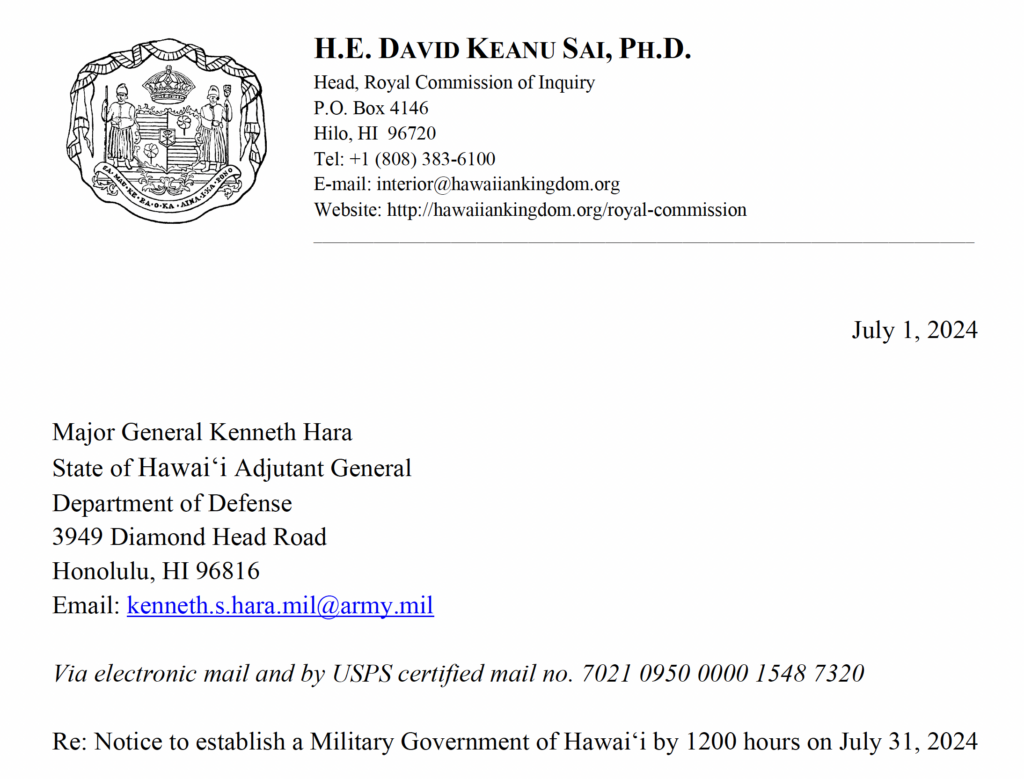On July 13, 2024, Dr. Keanu Sai, as Head of the Royal Commission of Inquiry, sent a final letter to Major General Kenneth Hara on the severe ramifications on the chain of command for the Hawai‘i Army National Guard, and, potentially the chain of command for the Air National Guard, if he does not delegate complete authority and title to Brigadier General Stephen Logan to establish a military government by 1200 hours on July 31, 2024. Here is a link to the letter.
The suspense date of 1200 hours on July 31, 2024, for your delegation or not of complete authority and title to Brigadier General Stephen Logan (“BG Logan”), is fast approaching. The purpose of this letter is to expand on the consequences should you not delegate authority and title for BG Logan to establish a military government. Your failure to do so will have dire consequences down the chain of command for the Army National Guard, and, potentially, for the Air National Guard.
The Council of Regency employs lawfare to achieve compliance with international law obligations. According to U.S. Air Force Major General Charles Dunlap, Jr., lawfare is the strategy of using “law as a substitute for traditional military means to achieve an operational objective.” The Council of Regency’s operational objective is to compel compliance with international laws. Pursuant to prior written and verbal communication providing undisputed historical, factual and legal evidence of the continued existence of the Hawaiian Kingdom, fully substantiated at the conclusion of due diligence by your own Staff Judge Advocate, the use of lawfare in this instance by the Council of Regency is wholly justified.
The duration of the American occupation, which is now at 131 years, is not only unlawful but morally unacceptable. President Cleveland, in his message to the Congress, relied on jus ad bellum (law concerning the resort to military force) when he concluded that the invasion of Honolulu by U.S. Marines on January 16, 1893, and the overthrow of the government of the Hawaiian Kingdom on January 17, 1893, were unjustified “acts of war.” President Cleveland stated:
It has been the boast of our Government that it seeks to do justice in all things without regard to the strength or weakness of those with whom it deals. I mistake the American people if they favor the odious doctrine that there is no such thing as international morality, that is one law for a strong nation and another for a weak one, and that even by indirection a strong power may with impunity despoil a weak one of its territory. By an act of war, committed with the participation of a diplomatic representative of the United States and without authority of Congress, the Government of a feeble but friendly and confiding people has been overthrown. A substantial wrong has thus been done which a due regard for our national character as well as the rights of the injured people requires we should endeavor to repair.
The 2015 Law of War Manual identifies certain jus ad bellum criteria to be “a competent authority to order the war for a public purpose,” and “a just cause (such as self-defense).” These criteria were relied on by President Cleveland in his message to the Congress in 1893, which has remained unchanged under current U.S. military doctrine. Despite the unlawfulness of the acts of war that have led to this prolonged occupation, jus in bello (laws of war) continues to be obligatory under the law of armed conflict, which is the military term for international humanitarian law.
According to Lauterpact, an illegal war is “a war of aggression undertaken by one belligerent side in violation of a basic international obligation prohibiting recourse to war as an instrument of national policy.” However, despite the President’s admittance that the acts of war were not in compliance with jus ad bellum, the United States was still obligated to comply with jus in bello when it occupied Hawaiian territory. In particular, the international rule for the occupant to transform the civilian government into a military government to administer the laws of the occupied State until the conclusion of a peace treaty. In the Hostages Trial (the case of Wilhelm List and Others), the Tribunal stated, “whatever may be the cause of a war that has broken out, and whether or not the cause be a so-called just cause, the same rules of international law are valid as to what must not be done, [and what] may be done.” What ‘must not be done’ is the unlawful imposition of American municipal laws and administrative measures within the territory of the Hawaiian Kingdom. In other words, the law of occupation still applies despite the illegality of the American occupation of the Hawaiian Kingdom.
President Cleveland’s conclusion that a ‘substantial wrong has thus been done which a due regard for our national character as well as the rights of the injured people requires we should endeavor to repair’ remains true then as it does today. This falls under your duties to perform as the theater commander in the occupied State of the Hawaiian Kingdom. The failure for the U.S. Marines to establish a military government on January 17, 1893, and the failure since by all preceding Adjutant Generals, beginning with Colonel John H. Soper, does not relieve you of your duty to do so today. This duty, under U.S. Department of Defense Directive 5100.01 and Army regulation paragraph 3, FM 27-5, to establish a military government, is directly linked to President Cleveland’s conclusion that ‘the rights of the injured people requires we should endeavor to repair.’ The establishment of a military government will serve both to end the prolonged violations and victimizations and begin to repair the rights of the injured Hawaiian people under the law of occupation.
In its Law of War Manual, the U.S. Department of Defense concluded that “[c]ommanders have duties to take necessary and reasonable measures to ensure that their subordinates do not commit violations of the law of war [jus in bello].” It should also be noted that a commander can be held accountable for the conduct of forces under his command, either by taking an active role in the commission of a war crime(s), or by omission in failing to prevent the commission of a war crime(s). The forces under your command are the Hawai‘i Army and Air National Guard, which include police officers.
On May 29, 2024, police officers, both active and retired from across the islands, called upon you to perform your duty. This letter from law enforcement officers is at odds with the instructions given to you by Attorney General Lopez to ignore the calls for you to transform the State of Hawai‘i into a military government. Their letter to you stated:
We hope this letter finds you in good health and high spirits. We are writing to you on behalf of a deeply concerned group of Active and Retired law enforcement officers throughout the Hawaiian Islands, about the current governance of Hawaii and its impact on the vested rights of Hawaiian subjects under Hawaiian Law.
As you are well aware, the historical transition of Hawai‘i from a sovereign kingdom to a U.S. state is fraught with significant legal and ethical issues. The overthrow of the government of the Hawaiian Kingdom in 1893 and its subsequent annexation by the United States in 1898 continue to be an illegal act. The Hawaiian Kingdom was recognized as a Sovereign State by the Permanent Court of Arbitration in The Hague, Netherlands, in Larsen vs. Hawaiian Kingdom (https://pca-cpa.org/en/cases/35/).
At the center of the dispute, as stated on the PCA’s website on the Larsen case, was the unlawful imposition of American laws over Lance Larsen, a Hawaiian subject, that led to an unfair trial and incarceration. It was a police officer, who believed that Hawai‘i was a part of the United States and that he was carrying out his lawful duties, that cited Mr. Larsen, which led to his incarceration. That police officer now knows otherwise and so do we. This is not the United States but rather the Hawaiian Kingdom as an occupied State under international law.
It is deeply troubling that the State of Hawaii has not been transitioned into a military government as mandated by international law. This failure of transition places current police officers on duty that they may be held accountable for unlawfully enforcing American laws. This very issue was brought to the attention of the Maui County Corporation Counsel by Maui Police Chief John Pelletier in 2022. In their request to Chief Pelletier, which is attached, Detective Kamuela Mawae and Patrol Officer Scott McCalister, stated:
We are humbly requesting that either Chief John Pelletier or Deputy Chief Charles Hank III formally request legal services from Corporation Counsel to conduct a legal analysis of Hawai‘i’s current political status considering International Law and to assure us, and the rest of the Police Officers throughout the State of Hawai‘i, that we are not violating International Law by enforcing U.S. domestic laws within what the federal lawsuit calls the Hawaiian Kingdom that continues to exist as a nation state under international law despite its government being overthrown by the United States on 01/17/1893.
Police Chief Pelletier did make a formal request to Corporation Counsel, but they did not act upon the request, which did not settle the issue and the possible liability that Police Officers face.
Your failure to initiate such a transition may be construed as a violation of the 1907 Hague Regulations and the 1949 Geneva Convention, which outlines the obligations of occupying powers. Also, your actions, or lack thereof, deprive Hawaiian subjects of the protections and rights they are entitled to under Hawaiian Kingdom laws and international humanitarian law. According to the Geneva Convention, occupying powers are obligated to respect the laws in force in the occupied territory and protect the rights of its inhabitants. Failure to comply with these obligations constitutes a serious violation and can result in accountability for war crimes for individuals in positions of authority.
The absence of a military government perpetuates an unlawful governance structure that has deprived the rights of Hawaiian subjects which is now at 131 years. The unique status of these rights is explained at this blog article on the Council of Regency’s weblog titled “It’s About Law—Native Hawaiian Rights are at a Critical Point for the State of Hawai‘i to Comply with the Law of Occupation” (https://hawaiiankingdom.org/blog/native-hawaiians-are-at-a-critical-point-for-the-state-of-hawaii-to-comply-with-the-law-of-occupation/). It is imperative that steps be taken to rectify these historical injustices and ensure the protection of the vested rights of Hawaiian subjects.
We also acknowledge that the Council of Regency is our government that was lawfully established under extraordinary circumstances, and we support its effort to bring compliance with the law of occupation by the State of Hawai‘i, on behalf of the United States, which will eventually bring the American occupation to a close. When this happens, our Legislative Assembly will be brought into session so that Hawaiian subjects can elect a Regency of our choosing. The Council of Regency is currently operating in an acting capacity that is allowed under Hawaiian law.
We urge you to work with the Council of Regency in making sure this transition is not only lawful but is done for the benefit of all Hawaiian subjects. Please consider the gravity of this situation and take immediate action to establish a military government in Hawaii. Such a measure would align with international law and demonstrate a commitment to justice, fairness, and the recognition of the rights of Native Hawaiians.
The U.S. military’s failure to establish a military government in 1893 has a direct nexus to the war crime of imposing American municipal laws and administrative measure here—usurpation of sovereignty during occupation, which the police officers brought to your attention. BG Logan is a former officer of the Honolulu Police Department, and his brother, Arthur Joseph Logan, was the former Adjutant General and is currently Chief of the Honolulu Police Department.
The establishment of the military government will, consequently, put a stop to this war crime and to the secondary war crimes it had set in motion. By your omission, in failing to prevent the commission of war crimes, you are accountable, as a commander, under the war crime by omission, which comprise two offenses under the Uniform Code of Military Justice: Article 92(1) for failure to obey […] regulation, and Article 92(3) for dereliction in the performances of duties. This conduct will result in the publication of War Criminal Report no. 24-0001 after 1200 hours on July 31, 2024, on the Royal Commission of Inquiry’s (“RCI”) website (https://hawaiiankingdom.org/royal-commission.shtml). As a matter of international law, the Council of Regency has a duty to protect the population from war crimes, which prompted the formation of the RCI on June 17, 2019. On this subject, I am attaching two recent law articles written by myself, as the Head of the RCI, and by Professor Federico Lenzerini, as the Deputy Head of the RCI, that was published by the International Review of Contemporary Law last month.
After the publication of the war criminal report, your Deputy Adjutant General, BG Logan, will assume the chain of command as the theater commander, because, as a war criminal, you would be unfit to continue to serve. BG Logan will then request Attorney General Lopez to provide him rebuttable evidence as to the Hawaiian Kingdom’s continued existence as a State since the nineteenth century. In particular, she would need to refute the legal opinions, as to the continuity of the Hawaiian Kingdom under international law, I mentioned in my letter to you dated July 1, 2024, to wit:
Professor Matthew Craven, “Continuity of the Hawaiian Kingdom as a State under International Law,” in David Keanu Sai (ed.) Royal Commission of Inquiry: Investigating War Crimes and Human Rights Violations Committed in the Hawaiian Kingdom 125-149 (2020).
Professor William Schabas, “War Crimes Related to the United States Belligerent Occupation of the Hawaiian Kingdom,” in David Keanu Sai (ed.) Royal Commission of Inquiry: Investigating War Crimes and Human Rights Violations Committed in the Hawaiian Kingdom 151-169 (2020).
Professor Federico Lenzerini, “International Human Rights Law and Self-Determination of Peoples related to the United States Occupation of the Hawaiian Kingdom,” in David Keanu Sai (ed.) Royal Commission of Inquiry: Investigating War Crimes and Human Rights Violations Committed in the Hawaiian Kingdom 173-216 (2020).
Professor Federico Lenzerini, “Legal Opinion on the Authority of the Council of Regency of the Hawaiian Kingdom,” 3 Hawaiian Journal of Law and Politics 317-333 (2021).
Professor Federico Lenzerini, Legal Opinion of Civil Law on Juridical Fact of the Hawaiian State and the Consequential Juridical Act by the Permanent Court of Arbitration (December 5, 2021).
In the absence of evidence by the Attorney General refuting these legal opinions, BG Logan will have seven days, from the date of the publication of the war criminal report, to perform his duty of establishing a military government.
Should BG Logan fail to perform his duty, he will also be the subject of a war criminal report for the war crime by omission to be published on the RCI’s website. This will result for the Commander of the 25th Infantry Brigade Combat Team, Colonel David R. Hatcher II, to assume the chain of command and request that the Attorney General provide him evidence refuting the mentioned legal opinions. In the absence of such evidence, Colonel Hatcher will have seven days, from the date of the publication of BG Logan’s war criminal report, to perform his duty of establishing a military government. This process will continue down the chain of command until there is a soldier that understands what it is to be duty bound in order to perform his/her duty of establishing a military government.
To prevent this sequence of events, you are duty bound to determine whether Attorney General Lopez’s instruction to you is a lawful order under military law. As I stated in my letter to you dated July 3, 2024, to determine that it is a lawful order, you should request she provide you evidence that the Hawaiian Kingdom no longer exists as an occupied State under international law. Just as you tasked your Staff Judge Advocate, LTC Phelps, you should demand that Attorney General Lopez provide you with evidence that rebut the presumption of State continuity of the Hawaiian Kingdom under international law. In the absence of such evidence, you must perform your duty to establish a military government.
You should be aware that Attorney General Lopez does not possess the qualifications of an expert in international law matters as does Professor Matthew Craven from the University of London SOAS, Law Department; Professor William Schabas from Middlesex London University, Law Department; and Professor Federico Lenzerini from the University of Siena Department of Political and International Science, who authored legal opinions for the Council of Regency and the Royal Commission of Inquiry. Professor Lenzerini previously served as a professor of international law at the University of Siena Law Department. All three are professors of international law. Should you rely on her unqualified opinion, you, and you alone, have created a crisis for the chain of command of the Army National Guard, and, possibly, the Air National Guard.
You should also be aware that the Attorney General is a subject of the RCI’s War Criminal Report no. 23-0001 for the war crime of usurpation of sovereignty during military occupation that was published on March 29, 2023. You are receiving instructions from a war criminal that is subject to prosecution by a competent court with subject matter jurisdiction. There are no statutory limitations for war crimes.
Your decision to delegate or to not delegate has profound ramifications for the Hawai‘i National Guard that you lead as their Adjutant General. Commanders must make command decisions to protect the men and women under their command. As I stated, if Attorney General Lopez can provide you clear evidence that the Hawaiian Kingdom ceases to exists, then you have no miliary duty to perform. But if she is unable to provide you with evidence, except for an unqualified instruction, you, and you alone, will be derelict in your military duty and will be held accountable as a war criminal in the annals of Hawaiian history. These letters to you will serve as evidence of the war crime by omission. This is lawfare.

